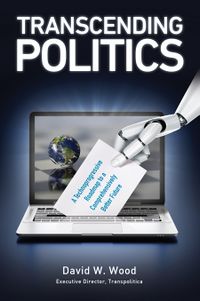Transcending Politics
Перейти к навигации
Перейти к поиску

Transcending Politics is a 2018 book by David Wood with the following declaration on its inside cover[1]:
Politics is broken. Technology risks making matters worse. But transhumanism can fix it, comprehensively.
The book is positioned as being the third book-length publication from the Transpolitica think tank. But whereas the two previous books were collections of essays by a variety of different authors, this book contains a single narrative voice throughout.
Themes[править]
Themes addressed in the book include[2]:
- Why technological change is presently making politics worse rather than better
- An integrative vision of sustainable abundance for everyone - and the technologies needed to achieve that outcome
- Ten legitimate causes of the fear and unrest that are destabilising society - and suggested technoprogressive responses to these issues
- The key role of the philosophy of transhumanism in accelerating the transformations needed for humanity to navigate through the existential landmines lurking in the near-future
- The fundamental importance of "super democracy" alongside the three traditional "supers" of transhumanist thought: super longevity, super intelligence, and super wellbeing
- The technological changes that can enable better humans and better politics to co-evolve over the next 10-20 years
- The opportunity to transcend the present-day divisiveness of right-wing vs. left-wing politics
- A roadmap of practical next steps.
Video preview[править]
Discussion[править]
Here are some points raised by reviewers where further discussion may be required than what is contained in the book:
- The case for including animal wellbeing in any measurement of desirable goals (rather than just "human wellbeing")
- The analysis in Chapter 4 of the growth of numbers of bank employees taking place in parallel with the adoption of ATMs may overstate the size of that growth and misattribute the cause of any such growth (in which case the argument for impending technological unemployment becomes even stronger)[3]
- The potential for greater use of sortition[4] in the shadow organisations envisioned by the book
External links[править]
- Interview about the themes of the book, conducted by Nikola Danaylov
- Extracts from book chapters